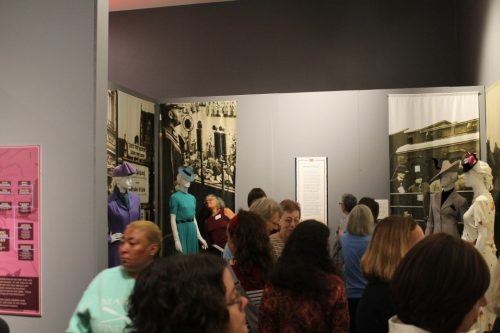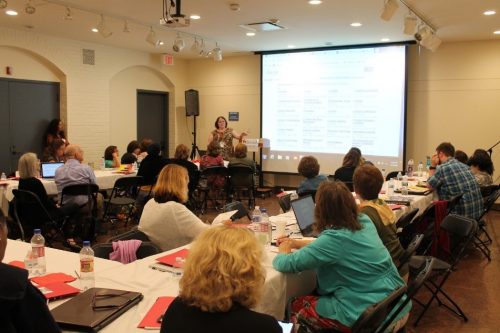Summer Teachers Institute Goes Virtual!

A blog post by Director of Education Ilene Dackman-Alon. To read more posts by Ilene click here.
JMM has been adapting to the new realities of classroom learning very quickly. The ability for our team to provide educational virtual experiences is quite new; and this spring was the first time that we were invited into the digital classroom to speak on topics like Jewish immigration to Baltimore, Scrap and the Holocaust. We are watching what other institutions are doing, so we know that the time investment in developing both in person and digital education experiences for the classroom only makea our programs more accessible for teachers. Over the past few months the amount of time we would have spent with children at the Museum has been devoted to developing online presentations for the digital classroom. We believe that even if schools do open up in the fall that taking field trips to JMM may still not be an option, so we hope that these digital offerings will be the way to connect with the students until COVID-19 is over.
During the first week of August, JMM will hold our Annual Summer Teachers Institute (STI), presented in partnership with the Baltimore Jewish Council (BJC), the Maryland State Department of Education (MSDE) and the Center for Jewish Education (CJE). STI is a professional development opportunity for teachers in the area of Holocaust Education. The goal of the program is to give educators the opportunity to meet with scholars and experts who are in the trenches of teaching best practices of Holocaust history and genocide studies. The topics associated with the Holocaust are vast, and over the years we have touched on topics like Persecution to Liberation, Rescue and Resistance, Propaganda, and last year’s theme: Women and the Holocaust, in connection with the powerful exhibit Stitching History from the Holocaust on loan from the Jewish Museum of Milwaukee (the other JMM!).

This year’s program will look different than in previous years due to the world health crisis and the inability for groups to gather. This summer we will be offering a virtual three-day workshop for teachers – Summer Teachers Institute 2020: Teaching Students to be Upstanders.
An Upstander is a person who speaks, acts or intervenes on behalf of a person being attacked or bullied. All students can learn to be upstanders by developing skills in social awareness, empathy and courage that can be applied in different situations. As educators, we must have the tools to teach upstander skills across all grade levels and provide opportunities for kids to practice the skills throughout the school year. We can provide examples of Upstanders using current events and historical examples, through role play and the arts, use peer-to-peer teaching, and connect it to the home and to the community.
Prior to COVID-19, we chose the topic of Upstanders for this year’s Summer Teachers Institute and over the past few months, we have been able to reach out to a diverse group of people for the workshop. One of the benefits of creating a virtual conference is that we are not limited to the number of participants due to the limits of physical space. Also, we do not have to worry about travel costs and we have outstanding presenters from all around the world participating in the conference this year.

Participants will learn about the organization’s mission to protect innocent people around the world and prevent genocide by combating racism and prejudice. Teachers will hear from child-survivor, Dr. Miriam Klein Kassenoff, Dr. Kassenoff is the Director of the Holocaust Teachers Institute, School of Education and Human Development at the University of Miami and will share her family’s story of escape from Europe. The afternoon will be spent with Paul Kutner, Upper School Director of Global Learning at the Bullis School who will transport the teachers to Le Chambon-sur-Lignon in south-central France. During World War II the residents of the village made a haven for Jews fleeing from Nazi persecution. Throughout the three days, teachers will have the opportunity to get into breakout sessions for discussion about classroom strategies and possible lesson plans and implementation plans.
Day Two will include presentations from our colleagues at the United States Holocaust Memorial Museum and the Center for Jewish Education. The afternoon will include a three hour with our partners from Echoes & Reflections: Teaching the Holocaust, Inspiring the Classroom. Our teachers will be participating in a new program, Choices Matter: Complicity and Action During the Holocaust. Our last day is a travel day in that our teachers will wake-up and go to Warsaw, Poland to meet our colleagues from the organization, Forum of Dialogue. Our teachers will learn about The School for Dialog, an innovative education program for students in secondary-level Polish schools. Students learn specifically about the role that Jewish people played in their own towns and about local history that often is completely unknown to them Presenters will share with teachers how they have succeeded in creating a unique educational initiative that combines exploring local history with confronting stereotypes, while also encouraging local activism.
Following this presentation, our teachers will have the privilege to hear second-generation testimony featuring Lola Hahn, a community member and JMM Board member. Ms. Hahn’s mother and aunt were both workers in Oskar Schindler’s factory in Poland, Teachers will have the opportunity to ask questions following Ms. Hahn’s testimony. The afternoon session will be spent with JMM educators who will share lessons plans that will be available for the classroom in fall 2020.

Our final session, teachers will travel to Boise, Idaho to the Wassmuth Center for Human Rights and the Anne Frank Memorial. Teachers will have a virtual tour of the site and learn about the education programs at the Human Rights Center. Participants will have the opportunity to hear testimonies from survivors of contemporary genocide, and learn classroom strategies to teach about the “Spiral of Injustice” and being an Upstander.
We have a full three days planned for this year’s Summer Teachers Institute. If you know at teacher that would benefit from this professional development opportunity, please share the STI2020 Flyer along with the registration link: http://tinyurl.com/JMM-STI2020!
Download our Summer Teachers Institute 2020 Flier
The Summer Teachers Institute is made possible, in part, through the generous support of Judy and Jerry Macks and the Joan and Joseph Klein, Jr. Foundation. We are also very greatful for our partner organizations, including Echoes & Reflects, the Wassmuth Center for Human Rights, World Without Genocide, the United States Holocaust Memorial Museum, and the Forum for Dialogue.
If you have any questions about this year’s program or the Summer Teachers Institute in general, please feel free to contact the JMM’s Education Director, Ilene Dackman-Alon, email idackmanalon@jewishmuseummd.org.
